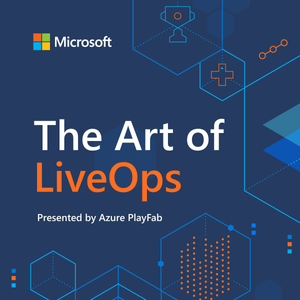
Episode 76: Enjoy the Interview with Laurie Barth
09/20/21 • 63 min
This week's episode is sponsored by Cloudflare Pages!
Laurie Barth, or Laurie on Tech as she is well-known in the dev industry, is a software engineer who started as a mathematician, currently working as a Senior Software Engineer at Netflix. Additionally, Laurie is a content creator and technical educator across various mediums. She is also a frequent conference speaker, speaking at events across the globe, and a technical blogger contributing to publications such as CSS Tricks, Smashing Magazine, and A List Apart, as well as an active member of the TC39 Educator's committee and a Google Developer Expert. In today’s episode, we share some of our more memorable job interview experiences, both good and bad, but mostly terrible, and we dive into how those experiences could be improved upon, starting with the company setting realistic expectations for potential candidates from the beginning. We also touch on unnecessary and unfair technical demonstrations, the value of affording candidates the option to show themselves in their best light, and the inherent biases that exist when interview panels aren’t diverse, and Laurie highlights the power that candidates actually have given the shortage of engineers making this appeal to listeners: take some of that power back! Tune in today for all this and so much more, including, of course, our weekly picks.
Key Points From This Episode:
- Laurie shares a terrible technical interview that stands out from her experience.
- Why a generic interview format very rarely makes sense for any company.
- Why companies need to set their expectations at the beginning of the interview.
- The importance of recognizing how much time it takes to develop a technical interview.
- Why you can’t steal an interview from elsewhere rather than writing one yourself.
- The value of judging what is important based on the signal a company is looking for.
- Alex talks about one of the more memorable (read: terrible) interviews he has been through.
- Ari reflects on a pair programming interview that she describes as ‘interesting’.
- The pressure that is put onto incoming developers to demonstrate their technical skills when it isn’t necessary for the role they will fill.
- Laurie emphasizes why companies should be looking for someone to augment their team.
- Why it’s not about working with people ‘smarter’ than you, but people you can learn from.
- Laurie’s frustration with the use of trivia questions and the benefits of offering candidates options to present themselves in their best light.
- Tessa’s turn to share her experience with a terrible interview that featured live UI coding.
- The disconnect that exists between hiring managers, recruiters, and candidates.
- Laurie highlights the power that candidates hold given the shortage of engineers and urges listeners to take that power back.
- What Ari calls ‘douchebag alert’ questions, how people answer, and what it says about them.
- The gender bias that typically exists when interview panels aren’t gender diverse.
- Why it’s important for team members to meet potential candidates and vice versa.
- Tessa shares the acronym, REACTO: repeat, example, approach, code, test, optimize.
- How interviews tend to cater towards those who are extroverted, outgoing, and talkative.
- Laurie highlights some positive interview experiences and what companies can do better.
- Alex shares a tip about asking the same question of everybody, such as “what is the focus of your company?”
Tweetables:
“People can't read your mind. You need to preface, you need to set your expectations at the beginning [of the interview].” — @laurieontech [0:07:45]
“I want to work with people who are smarter than I am, but here's the trip: everyone is smarter than I am. It depends what the measuring stick is and what category we're talking about.” — @laurieontech [0:26:51]
“The goal of an interview, in my mind, should be for people to show you what they know instead of what they don't know. If you're giving people options, you are giving them the opportunity to present themselves in their absolute [best light].” — @laurieontech [0:29:59]
“Right now, in this moment in time, unless you are an entry level candidate, the candidates have all the power. There's such a shortage of engineers. I would like to see people taking that power back a little bit.” — @laurieontech [0:38:41]
“Interviews, pretty much no mat...
This week's episode is sponsored by Cloudflare Pages!
Laurie Barth, or Laurie on Tech as she is well-known in the dev industry, is a software engineer who started as a mathematician, currently working as a Senior Software Engineer at Netflix. Additionally, Laurie is a content creator and technical educator across various mediums. She is also a frequent conference speaker, speaking at events across the globe, and a technical blogger contributing to publications such as CSS Tricks, Smashing Magazine, and A List Apart, as well as an active member of the TC39 Educator's committee and a Google Developer Expert. In today’s episode, we share some of our more memorable job interview experiences, both good and bad, but mostly terrible, and we dive into how those experiences could be improved upon, starting with the company setting realistic expectations for potential candidates from the beginning. We also touch on unnecessary and unfair technical demonstrations, the value of affording candidates the option to show themselves in their best light, and the inherent biases that exist when interview panels aren’t diverse, and Laurie highlights the power that candidates actually have given the shortage of engineers making this appeal to listeners: take some of that power back! Tune in today for all this and so much more, including, of course, our weekly picks.
Key Points From This Episode:
- Laurie shares a terrible technical interview that stands out from her experience.
- Why a generic interview format very rarely makes sense for any company.
- Why companies need to set their expectations at the beginning of the interview.
- The importance of recognizing how much time it takes to develop a technical interview.
- Why you can’t steal an interview from elsewhere rather than writing one yourself.
- The value of judging what is important based on the signal a company is looking for.
- Alex talks about one of the more memorable (read: terrible) interviews he has been through.
- Ari reflects on a pair programming interview that she describes as ‘interesting’.
- The pressure that is put onto incoming developers to demonstrate their technical skills when it isn’t necessary for the role they will fill.
- Laurie emphasizes why companies should be looking for someone to augment their team.
- Why it’s not about working with people ‘smarter’ than you, but people you can learn from.
- Laurie’s frustration with the use of trivia questions and the benefits of offering candidates options to present themselves in their best light.
- Tessa’s turn to share her experience with a terrible interview that featured live UI coding.
- The disconnect that exists between hiring managers, recruiters, and candidates.
- Laurie highlights the power that candidates hold given the shortage of engineers and urges listeners to take that power back.
- What Ari calls ‘douchebag alert’ questions, how people answer, and what it says about them.
- The gender bias that typically exists when interview panels aren’t gender diverse.
- Why it’s important for team members to meet potential candidates and vice versa.
- Tessa shares the acronym, REACTO: repeat, example, approach, code, test, optimize.
- How interviews tend to cater towards those who are extroverted, outgoing, and talkative.
- Laurie highlights some positive interview experiences and what companies can do better.
- Alex shares a tip about asking the same question of everybody, such as “what is the focus of your company?”
Tweetables:
“People can't read your mind. You need to preface, you need to set your expectations at the beginning [of the interview].” — @laurieontech [0:07:45]
“I want to work with people who are smarter than I am, but here's the trip: everyone is smarter than I am. It depends what the measuring stick is and what category we're talking about.” — @laurieontech [0:26:51]
“The goal of an interview, in my mind, should be for people to show you what they know instead of what they don't know. If you're giving people options, you are giving them the opportunity to present themselves in their absolute [best light].” — @laurieontech [0:29:59]
“Right now, in this moment in time, unless you are an entry level candidate, the candidates have all the power. There's such a shortage of engineers. I would like to see people taking that power back a little bit.” — @laurieontech [0:38:41]
“Interviews, pretty much no mat...
Previous Episode

Episode 75: Enjoy the Mew: Healing Community Paper Cuts with Jason Etcovitch
Imagine working on projects that last for two weeks or less. This is what today’s guest, Jason Etcovich, gets to do all the time! Jason is a Senior Software Engineer at GitHub, where he is part of the Special Projects team. He is also involved in the Paper Cuts project, which works directly with the community to fix small to medium workflow problems. In this episode, Jason sheds light on how he became a software engineer having come from a design background. While this may sound like a drastic shift, it was gradual, which made the transition smoother. We talk about some of the exciting happenings at GitHub, like GitHub Pilot, Paper Cut, and Codespaces, and what these projects will offer the community. Our conversation also touches on automation and where it goes right and wrong, how to use software to make our lives better, and as usual, we get into some classic developer debates. Tune in to hear it all.
Key Points From This Episode:
- Get to know today’s guest, Jason Etcovitch, and want he does.
- How Jason went from graphic design to working at GitHub.
- Hear more about the work that Jason does through Paper Cuts.
- Insights into Paper Cuts’ research and how they decide which projects to take on.
- The importance of having a design thinking mindset when you problem solve.
- A high-level view of GitHub Pilot, GitHub’s new machine learning feature.
- What it is like working on projects that do not last longer than two weeks.
- The open graph image generator project Jason is excited about.
- How to justify projects without necessarily having the data to back up projects.
- Some of the ways we can make our lives better with software, according to Jason.
- Common pitfalls Jason sees when trying to set up automations.
- Everyone’s take on Prettier and Standard JS.
- Getting into the semicolon debate: everyone weighs in.
- What everyone thinks about the age-old tabs versus spaces fight.
- A look at one of GitHub’s latest releases, Codespaces.
- Hear what the picks for the week are.
Tweetables:
“Part of learning that design mindset is understanding like, how does a person approach this thing? What are the various touch points that they have to consider?” — @JasonEtco [0:10:03]
“How do you say like, ‘Oh, yes. This is important,” If you don't have the data to back it up.” How do you get the data to back it up, if you don't prioritize that project? Where in that loop does it fit to get all of that data?” — @JasonEtco [0:19:57]
“If you build your automation tool in an inflexible way, you'll really regret it later.” — @JasonEtco [0:27:13]
Links Mentioned in Today’s Episode:
- ProBot
- Github Feedback
- Alex Tweets at Nat
- StandardJS
- Jason on Twitter
- Jason's Website
- Wyze Camera
- She-Ra and the Princesses of Power (Netflix)
- Marple (puzzle game)
- VSCode in the browser, Joel Califa
- The Matrix
- @EnjoyTheVueCats
Special Guest: Jason Etcovitch.
Next Episode

Episode 77: Enjoy the Petite Vue with Dave Rupert
This week's episode is sponsored by Cloudflare Workers!
Have you ever wished that Vue was smaller? We know we have. Petite-Vue is an astonishing 5.5KB, which is so small, it’s almost invisible. Dave Rupert, a developer at Paravel, joins us today to discuss all things Petite-Vue. We hear how this smaller version was released, and Dave shares what his experience of using it has been like. Often, when a framework is more compact, there are tradeoffs or sacrifices users have to make, but this does not seem to be the case with Petite-Vue. We talk about Alpine, how Petite-Vue is different, and we also get stuck into the use cases for Petite-Vue. Dave shares one of his totally wild ideas, which, naturally, Alex is all over. Our wide-ranging conversation also touches on interviews and what needs to change with them, templates and styles, and as usual, we wrap up with everyone’s picks for the week. Tune in to hear it all!
Key Points From This Episode:
- Get to know today’s guest, Dave Rupert.
- Everyone's take on how they would feel if Vue was five kilobytes.
- The story of how Petite-Vue came to be released.
- Dave’s experience of using Alpine and some of the challenges he had with this.
- What the jump from Vue to Petite-Vue is like.
- Hear about the idea that Dave runs past Alex.
- Some other great use cases for Petite-Vue.
- Unpacking the broken coding interview system; things need to change.
- Questioning some obscure hiring requirements.
- The framework Dave uses given that he works in an agency.
- In business, frameworks can become politicized and sites for contention.
- Things other people do that make everyone believe they are monsters.
- Diving into the world of template style and script.
- Where you can find Dave online to tell him how wrong he is about all his choices.
- Everyone’s picks for this week; there are some great ones!
Tweetables:
“I think five kilobytes is the perfect stealth technology, like Alex is talking about that you can kind of sneak it into a project and no one’s going to go, ‘Hey, hey, hey, what’s going on now? I didn’t approve this.’” — @davatron5000 [0:02:54]
“I was kind of a late bloomer I guess for Vue but I just was like, you know, I think the more I’ve used Vue, the more it has all the features I like.” — @davatron5000 [0:37:36]
“I’m just saying if you drop the opening curly brace on a four loop, you’re a monster.” — @davatron5000 [0:47:58]
Links Mentioned in Today’s Episode:
- My petite-vue Review, Dave Rupert
- Evan You’s petite-vue preview, Twitter
- Angie Jones, Twitter
- Twitter: davatron5000
- Website: daverupert.com
- Mini Motorways, Dinosaur Polo Club (Apple Arcade, Steam)
- Bubble, Morris, Morgan, Cliff, Riess
- Chester's Cheddar Flavored Paws Cheese Flavored Snacks
- Bat,bat Black Coffee Soda
- Special, Netflix
- The Great Ace Attorney Chronicles, Capcom (Nintendo Switch, PlayStation 4, Steam)
Special Guest: Dave Rupert.
Sponsored By:
If you like this episode you’ll love
Episode Comments
Generate a badge
Get a badge for your website that links back to this episode
<a href="https://goodpods.com/podcasts/enjoy-the-vue-35371/episode-76-enjoy-the-interview-with-laurie-barth-16589534"> <img src="https://storage.googleapis.com/goodpods-images-bucket/badges/generic-badge-1.svg" alt="listen to episode 76: enjoy the interview with laurie barth on goodpods" style="width: 225px" /> </a>
Copy




